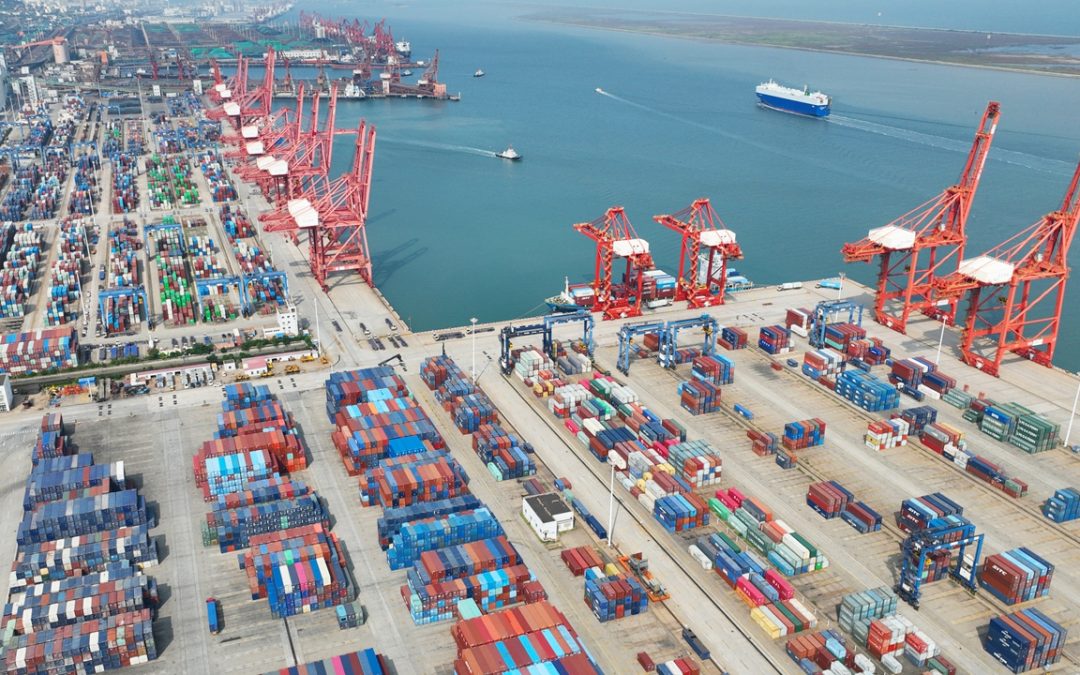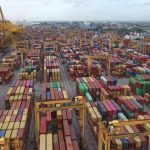Sea freight rates in China have returned to a reasonable level after reaching record highs last year and early this year amid global inflation, the epidemic and geopolitical conflicts, data from the China Federation of Logistics and Purchasing (CFLP) showed on Friday.
Domestic traders said the drop in rates, which have been a major contributor to high goods costs, can be a potential driver for sluggish overseas demand and a way to gain an edge in the world market.
The CFLP figures showed that while logistics costs have been relatively high so far this year, the rate of increase began to slow in the third quarter.
The average reading for the export container freight index in August was 3,033.60 points, down 6.4 percent from the average of the previous month.
Supply and demand in the road transportation market were basically stable, with the road logistics freight index at 103 points, down 0.16 percent from the previous month.
He Liming, CFLP president, told reporters on Friday that the declines were reasonable in light of record high rates caused by insufficient capacity in the previous period.
The drops “will improve the competitiveness of our enterprises, especially export enterprises,” He said.
Just before the National Day holidays, the cost of a standard container from China to the US West Coast fell below $2,000, a new low since the start of the epidemic. It was above $20,000 last year.
The Drury World Container Index released on Thursday showed that this week was the 32nd consecutive week of declines, with a 40-foot container costing $3,688.75, an 8 percent fall, and 64 percent below the peak of $10,377 reached in September 2021.
Zhong Zhechao, founder of One Shipping, an international logistics service consulting firm, told the Global Times on Friday that lower freight rates are definitely good news for exporters, because cargo rates represent a fairly large part of total costs – even more at times than the value of the goods.
The impact of lower cargo rates has already been partially reflected in rising container throughput in the Yangtze River Delta, China’s production and trade hub.
In addition to Shanghai port, which was partially affected by the epidemic, other ports in the Yangtze River Delta saw double-digit growth from January to August. Among them, Ningbo Zhoushan port, the world leader in throughput, handled 23.7 million standard containers, up 10.9 percent year-on-year, according to data that the port sent to the Global Times on Friday.
A manager with a Shenzhen-based export company told media that shipping costs could account for about 60 percent of total production costs at the peak, but now it’s only about 10 percent, which is very good news for the company’s export business, CCTV News reported on September 29.
“Export orders have jumped by 30 percent since the rate fall,” the manager said.
Industry insiders said that it will still take some time to see how lower cargo rates will affect China’s exports.
Low freight rates also reflect weak demand, Roy Yang, general manager of Zhejiang Yongda International Forwarding Agency, told the Global Times on Friday.
“Previously, the days before the National Day holidays were our busiest time of the year in terms of order delivery, which usually took about two weeks. This year, it only lasted for two days,” Yang said.
Lower cargo rates have also put producers and traders who signed long-term contracts with shipping companies at a disadvantage, the Global Times learned.
Low cargo rates can boost exports, but they also reflect a sluggish global market. It’s “two sides of the coin,” Zhong said, predicting that rates will keep falling for the rest of the year, as capacity expands due to new ships being delivered.
Source: Hellenic Shipping News






